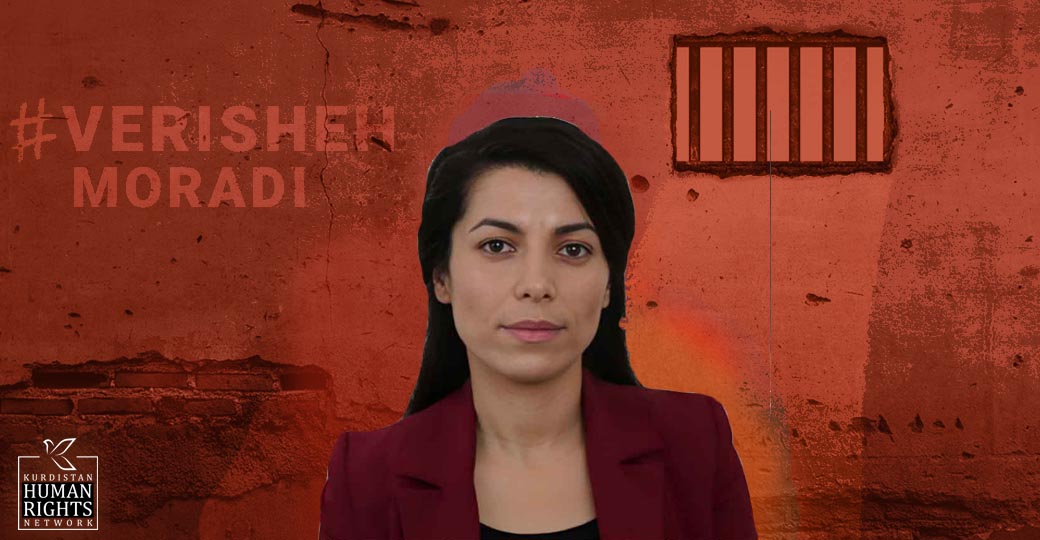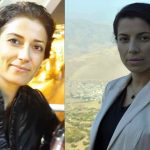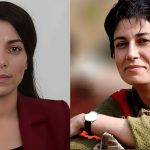Wrisha Moradi, a graduate in biology, spent several years working as a sports coach for underprivileged children and as a civil rights activist focused on women’s and student issues in Sanandaj, Kurdistan Province.
In 2010, she moved to the Kurdistan Region of Iraq, where she continued her activities by joining the East Kurdistan Free Women Society (KJAR).
She participated in the fight against the Islamic State (IS) in Syrian Kurdistan (Rojava) in 2014 and was injured during the defence of Kobani.
Arrest
Moradi was arrested by the Ministry of Intelligence on 1 August 2023 at the entrance to Sanandaj, Kurdistan Province, upon her return from Kermanshah, Kermanshah Province, where she had been involved in political and organisational activities.
She spent the first 13 days of her detention in the detention centre of this security institution in Sanandaj, and afterwards was transferred to Ward 209 of Evin Prison in Tehran.
During this period, she was subjected to pressure and threat for forced confessions, and on 26 December 2023, after enduring five months of solitary confinement, she was transferred to the women’s ward of Evin Prison.
Judicial Process
In February 2024, after two appearances in Branch Five of the Evin Security Prosecutor’s Office, she was charged with “armed insurrection” (baghi), which carries the death penalty in Iran.
Her first court session took place on 16 June 2024 in Branch 15 of the Islamic Revolutionary Court of Tehran, presided over by Judge Abolghassem Salavati. During this session, neither she nor her lawyers were allowed to defend her case.
She refused to attend the second session of her trial at Branch 15 of the Islamic Revolutionary Court in Tehran in protest at the death sentences handed down to Pakhshan Azizi and Sharifeh Mohammadi.
Current Status
Moradi is being held in the women’s ward of Evin Prison.
Additional Information
– On 26 September 2023, KJAR issued a statement confirming Moradi’s arrest, saying that their member was in the region to “carry out political activities and organise women” in Kurdistan. They called on international human rights organisations to speak out against the “forced disappearance” and “fabricated charges by security agencies” against the KJAR member.
– On 8 November 2023, the Bitawan website, which is affiliated with the Ministry of Intelligence, reported the arrest of three individuals, including Wrisha Moradi and Pakhshan Azizi. While the website did not specify the date of their arrest, it described them as members of the Kurdistan Free Life Party (PJAK).
– On 9 April 2024, her first court session was cancelled due to the absence of Judge Mohammadreza Amouzad, an associate judge of Branch 15 of the Islamic Revolutionary Court of Tehran.
– On 14 May 2024, under the orders of Judge Salavati, she was transferred from the women’s ward of Evin Prison to Ward 209 of the Ministry of Intelligence in the prison for further interrogation.
– On 15 May 2024, she went on a hunger strike in protest against her transfer to Ward 209 of Evin Prison.
– On 16 May 2024, she ended her hunger strike after being returned to the women’s ward of Evin Prison.
– On 4 August 2024, in a letter released from prison entitled “IS beheads, the Islamic Republic hangs”, she defended her political beliefs and activities, described her arrest and the torture she had endured, and announced that she had refused to attend the second session of her trial at Branch 15 of the Islamic Revolutionary Court in Tehran in protest at the death sentences imposed on Pakhshan Azizi and Sharifeh Mohammadi.
– On 6 August 2024, she protested with other female political prisoners in Evin Prison against the execution of Reza Rasaei. In response to these protests, prison guards attacked the women’s ward and assaulted several of the female political prisoners.
Notes:
1. The East Kurdistan Free Women Society (KJAR) was established in 2014 in the Qandil Mountains along the border of Iraqi Kurdistan with Iranian Kurdistan. It aims to combat “authoritarian, state, and sexist mindset and institutions” by organising women to achieve a “democratic nation” in Iranian Kurdistan.
KJAR’s programs state that it has “founded its own specialized organisations in political, social, cultural, economic, legal, environmental, ethical and aesthetic, diplomatic, and self-defence domains, built its own institutions sustainably, and ensures women’s freedom to democratize society”.
KJAR also participated in the establishment of the East Kurdistan Democratic and Free Society (KODAR) in 2014. KJAR’s headquarters is in the mountainous areas between Iraqi Kurdistan and Iranian Kurdistan.
2. Article 287 of the Islamic Penal Code: “A group engaging in armed rebellion against the Islamic Republic of Iran is considered rebellious, and if they use weapons, their members are subject to the death penalty.”
3. The Kurdistan Free Life Party (PJAK) was established in 2004 in the Qandil Mountains along the border of Iraqi Kurdistan with Iranian Kurdistan. This party follows the ideas of Abdullah Öcalan, the imprisoned leader of the Kurdistan Workers’ Party (PKK), and bases its activities on the paradigm of a “democratic and ecological society based on women’s freedom”.
According to the party’s charter, PJAK considers the establishment of democratic confederalism and a political form of democratic self-governance for organising people to build a “democratic nation” as one of its fundamental goals. PJAK also participated in the establishment of the East Kurdistan Democratic and Free Society (KODAR). The headquarters of this party is in the mountainous areas between Iraqi Kurdistan and Iranian Kurdistan.



